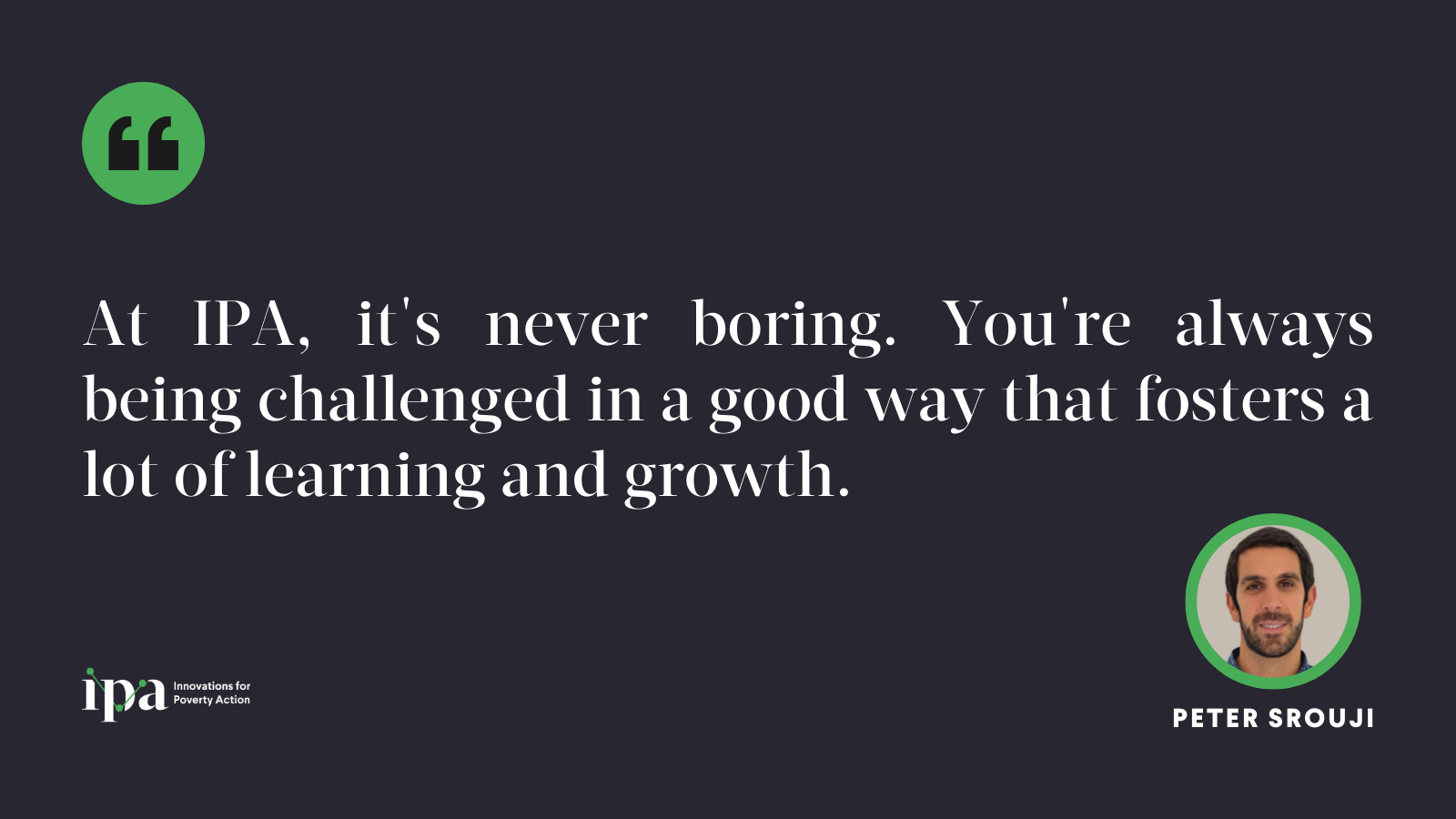Peter Srouji: You’re Always Being Challenged in A Good Way
This blog is part of a series of IPA staff sharing insights from their work. Read other blogs in this series from Tanvi Jaluka, Financial Inclusion Program Manager; and Walker Higgins, Country Director for Liberia and Sierra Leone.
To mark its 20th anniversary, Innovations for Poverty Action is publishing People of IPA, a series of profiles celebrating IPA’s diverse staff, highlighting their contributions, and discussing how and why they seek to improve the lives of those living in poverty. Peter Srouji, IPA’s Associate Director of Program Development, has worked with governments, NGOs, and private sector partners in areas as diverse as agriculture, social protection, remittances, nutrition, and governance.
“I think what sets us apart,” says Peter, “is that we take our partnerships very seriously.”
He’s referring to IPA’s work with partner organizations, such as government agencies, to evaluate the effectiveness of their programs. And he brings to that work experience that’s both broad and deep.
Peter joined IPA in 2011. At times, he has held three roles simultaneously: associate director for program development, interim country director for the organization’s Philippines office.
That’s quite a list. At IPA, such cross-posting is seen as an opportunity to test yourself, evolve professionally, and emerge with new skills -- all while advancing the organization’s mission to alleviate poverty.
“The thing is,” says Peter, “at IPA, it's never boring. You're always being challenged in a good way that fosters a lot of learning and growth.”
Evaluations use research to measure the impact of a specific development program. Traditionally, Peter says, that’s done on a “fly in, fly out” basis: a consultant or team arrives on site, studies the project, presents their findings, and leaves. “Their partners see them as, like, ‘Okay, they're off on their own doing the research, [then] they give us the results,’” he says.
IPA’s approach, on the other hand, seeks to empower its partners. “We do have this in-country presence,” says Peter, referring to the 20 countries where IPA has offices and deep, sustained ties. Through its country offices and embedded labs, IPA collaborates with its partners on evaluations, including teaching them about the research process.
“We do a lot of capacity-building with our partners from the beginning,” Peter says. “It doesn't always happen, but that's kind of our ideal and preferred approach, and it’s what we try to do as much as possible.”

He explains that IPA starts by understanding a partner’s policy priorities, developing a learning agenda, ensuring that any research is policy-relevant, and answering critical questions.
“But, also, we want to engage with them throughout,” he says, “especially during key milestones, so that there can be a learning process throughout the evaluation. And I think doing that fosters a sense of trust and ownership with the development partner. So, not just making sure that the research is policy-relevant, but that they trust the research and findings that are going to emerge from that.”
He recalls participating in an evaluation for a government agency -- a key IPA partner. It centered on a program intended to reduce child labor.
“We worked very closely with them,” he says. “It was a really great partnership. And one of the findings was that, on average, the program had no effect on child labor -- which is not the best result.” In fact, the data showed that among some of the sub-groups studied, child labor actually increased.
“You can imagine that the agency would be very resistant” to the news, says Peter. IPA presented its results privately to the partner, highlighting positive outcomes along with less favorable ones.
The outcome?
“What I was surprised by is that there was no resistance at all to the evaluation, and they completely trusted the results. They almost took them on wholeheartedly, and were like, ‘Okay, so what can we do going forward? What are the lessons?’” he says. The agency developed some short-term steps as an immediate response and expressed an interest in doing further research.
Peter credits the outcome to IPA’s way of doing things. “I think that's really the result of our collaborative approach to research and development,” he says.
“Our sense is that because we fostered such a close relationship with the partner, built capacity in impact evaluation, and we've had that in-country presence and long-term presence, that helps foster the trust that's needed for them to take on the results and do something with it.”












